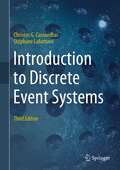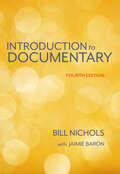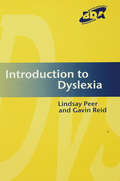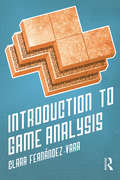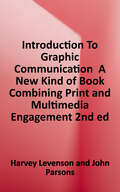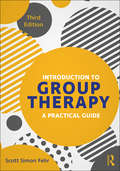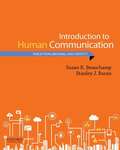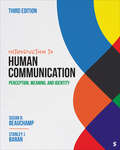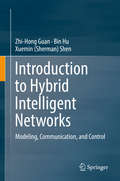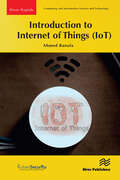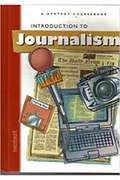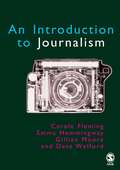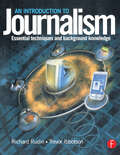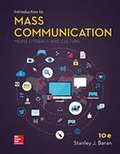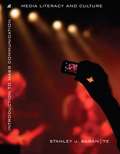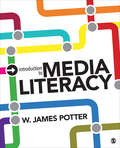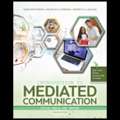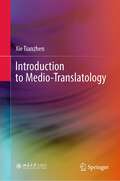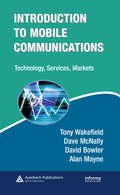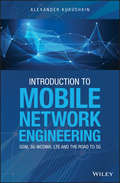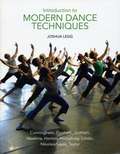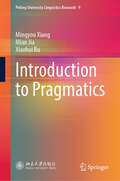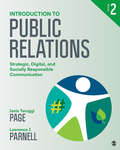- Table View
- List View
Introduction to Discrete Event Systems
by Christos G. Cassandras Stéphane LafortuneThis unique textbook comprehensively introduces the field of discrete event systems, offering a breadth of coverage that makes the material accessible to readers of varied backgrounds. The book emphasizes a unified modeling framework that transcends specific application areas, linking the following topics in a coherent manner: language and automata theory, supervisory control, Petri net theory, Markov chains and queueing theory, discrete-event simulation, and concurrent estimation techniques. Topics and features:detailed treatment of automata and language theory in the context of discrete event systems, including application to state estimation and diagnosiscomprehensive coverage of centralized and decentralized supervisory control of partially-observed systemstimed models, including timed automata and hybrid automatastochastic models for discrete event systems and controlled Markov chainsdiscrete event simulationan introduction to stochastic hybrid systemssensitivity analysis and optimization of discrete event and hybrid systemsnew in the third edition: opacity properties, enhanced coverage of supervisory control, overview of latest software toolsThis proven textbook is essential to advanced-level students and researchers in a variety of disciplines where the study of discrete event systems is relevant: control, communications, computer engineering, computer science, manufacturing engineering, transportation networks, operations research, and industrial engineering. Christos G. Cassandras is Distinguished Professor of Engineering, Professor of Systems Engineering, and Professor of Electrical and Computer Engineering at Boston University. Stéphane Lafortune is Professor of Electrical Engineering and Computer Science at the University of Michigan, Ann Arbor.
Introduction to Documentary, Fourth Edition
by Bill Nichols Jaimie BaronThe fourth edition of Bill Nichols's best-selling text, Introduction to Documentary, has been vastly altered in its entirety to bring this indispensable textbook up to date and reconceptualize aspects of its treatment of documentaries past and present. Here Nichols, with Jaimie Baron, has edited each chapter for clarity and ease of use and expanded the book with updates and new ideas.Featuring abundant examples and images, Introduction to Documentary, Fourth Edition is designed to facilitate a rich understanding of how cinema can be used to document the historical world as it is seen by a wide variety of filmmakers. Subjectivity, expressivity, persuasiveness, and credibility are crucial factors that move documentary film away from objective documentation and toward the thought-provoking realm of arguments, perceptions, and perspectives that draw from a filmmaker's unique sensibility to help us see the world as we have not seen it before. Exploring ethics, history, different modes of documentary, key social issues addressed, and both the origins and evolution of this form, this updated volume also offers guidance on how to write about documentaries and how to begin the process of making one. Introduction to Documentary, Fourth Edition will be of use not only to film students but also those in adjacent fields where visual representations of reality play an important role: journalism, sociology, anthropology, feminist and ethnic studies, among others.
Introduction to Dyslexia
by Gavin Reid Lindsay PeerThis work provides the class teacher with a straightforward introduction to dyslexia. The authors highlight methods of identification of dyslexia within the classroom context and provide examples of how dyslexia can be dealt with by the class teacher.
Introduction to Game Analysis
by Clara Fernández-VaraGame analysis allows us to understand games better, providing insight into the player-game relationship, the construction of the game, and its sociocultural relevance. As the field of game studies grows, videogame writing is evolving from the mere evaluation of gameplay, graphics, sound, and replayablity, to more reflective writing that manages to convey the complexity of a game and the way it is played in a cultural context. Introduction to Game Analysis serves as an accessible guide to analyzing games using strategies borrowed from textual analysis. Clara Fernández-Vara’s concise primer provides instruction on the basic building blocks of game analysis—examination of context, content and reception, and formal qualities—as well as the vocabulary necessary for talking about videogames' distinguishing characteristics. Examples are drawn from a range of games, both digital and non-digital—from Bioshock and World of Warcraft to Monopoly—and the book provides a variety of exercises and sample analyses, as well as a comprehensive ludography and glossary.
Introduction to Graphic Communication: A New Kind of Book, Combining Print and Multimedia Engagement
by John Parsons Harvey LevensonThis book is a survey of the complex world of graphic communication. It is focused largely on print, both conventional and digital, and the processes that make it possible. It is also about the myriad ways digital technology from desktop design to web-based publishing, commerce, and IT affects the art, science, and business of printing.
Introduction to Group Therapy: A Practical Guide (Third Edition)
by Scott Simon FehrThe main objective of Introduction to Group Therapy is to give the reader a solid understanding of group therapy while simultaneously creating scholars in the group therapy paradigm. This unique book combines theory and practice in a reader-friendly format, presenting practical suggestions to guide both students and novice group therapists through the nuts and bolts of running a group. This third edition continues the clinically relevant and highly readable work of the previous editions, demonstrating the therapeutic power group therapy has in conflict resolution and personality change. A proven resource for introductory and advanced coursework, the book promotes group therapy at the grassroots level – students – where it has the most opportunity to be put into effect.
Introduction to Human Communication: Perception, Meaning, and Identity
by Stanley J. Baran Susan R. BeauchampThey cover the basics of communication theory and research with examples while providing tools to students become more thoughtful, confident, and ethical communicators. <P><P>The text demonstrates the relevance of communication to our everyday lives and invites students to apply what they learn in a variety of contexts, including mass communication, organizational communication, health communication, and social media.
Introduction to Human Communication: Perception, Meaning, and Identity
by Stanley J. Baran Susan R. BeauchampNow published by Sage Introduction to Human Communication, Third Edition, offers a comprehensive and balanced survey of the discipline. Susan R. Beauchamp and Stanley J. Baran show students how central successful communication is to gaining effective control over perception, meaning making, and identity. After walking students through the basics of communication theory and research, they provide tools to help students become more competent, confident, employable, and ethical communicators. A diverse array of real-world examples and practical pedagogical tools help students apply what they′ve learned to a wide variety of communication contexts, including mass and digital communication, media literacy, health communication, interpersonal communication, organizational communication, and intercultural communication. This title is accompanied by a complete teaching and learning package. Contact your Sage representative to request a demo. Learning Platform / Courseware Sage Vantage is an intuitive learning platform that integrates quality Sage textbook content with assignable multimedia activities and auto-graded assessments to drive student engagement and ensure accountability. Unparalleled in its ease of use and built for dynamic teaching and learning, Vantage offers customizable LMS integration and best-in-class support. It’s a learning platform you, and your students, will actually love. Learn more. Assignable Video with Assessment Assignable video (available in Sage Vantage) is tied to learning objectives and curated exclusively for this text to bring concepts to life. Watch a sample video now. LMS Cartridge: Import this title’s instructor resources into your school’s learning management system (LMS) and save time. Don’t use an LMS? You can still access all of the same online resources for this title via the password-protected Instructor Resource Site. Learn more.
Introduction to Human Communication: Perception, Meaning, and Identity
by Stanley J. Baran Susan R. BeauchampNow published by Sage Introduction to Human Communication, Third Edition, offers a comprehensive and balanced survey of the discipline. Susan R. Beauchamp and Stanley J. Baran show students how central successful communication is to gaining effective control over perception, meaning making, and identity. After walking students through the basics of communication theory and research, they provide tools to help students become more competent, confident, employable, and ethical communicators. A diverse array of real-world examples and practical pedagogical tools help students apply what they′ve learned to a wide variety of communication contexts, including mass and digital communication, media literacy, health communication, interpersonal communication, organizational communication, and intercultural communication. This title is accompanied by a complete teaching and learning package. Contact your Sage representative to request a demo. Learning Platform / Courseware Sage Vantage is an intuitive learning platform that integrates quality Sage textbook content with assignable multimedia activities and auto-graded assessments to drive student engagement and ensure accountability. Unparalleled in its ease of use and built for dynamic teaching and learning, Vantage offers customizable LMS integration and best-in-class support. It’s a learning platform you, and your students, will actually love. Learn more. Assignable Video with Assessment Assignable video (available in Sage Vantage) is tied to learning objectives and curated exclusively for this text to bring concepts to life. Watch a sample video now. LMS Cartridge: Import this title’s instructor resources into your school’s learning management system (LMS) and save time. Don’t use an LMS? You can still access all of the same online resources for this title via the password-protected Instructor Resource Site. Learn more.
Introduction to Hybrid Intelligent Networks: Modeling, Communication, and Control
by Bin Hu Xuemin Sherman Shen Zhi-Hong GuanThis book covers the fundamental principles, new theories and methodologies, and potential applications of hybrid intelligent networks. Chapters focus on hybrid neural networks and networked multi-agent networks, including their communication, control and optimization synthesis. This text also provides a succinct but useful guideline for designing neural network-based hybrid artificial intelligence for brain-inspired computation systems and applications in the Internet of Things.Artificial Intelligence has developed into a deep research field targeting robots with more brain-inspired perception, learning, decision-making abilities, etc. This text devoted to a tutorial on hybrid intelligent networks that have been identified in nature and engineering, especially in the brain, modeled by hybrid dynamical systems and complex networks, and have shown potential application to brain-inspired intelligence. Included in this text are impulsive neural networks, neurodynamics, multiagent networks, hybrid dynamics analysis, collective dynamics, as well as hybrid communication, control and optimization methods. Graduate students who are interested in artificial intelligence and hybrid intelligence, as well as professors and graduate students who are interested in neural networks and multiagent networks will find this textbook a valuable resource. AI engineers and consultants who are working in wireless communications and networking will want to buy this book. Also, professional and academic institutions in universities and Mobile vehicle companies and engineers and managers who concern humans in the loop of IoT will also be interested in this book.
Introduction to Internet of Things (River Publishers Series in Rapids in Computing and Information Science and Technology)
by Ahmed BanafaThis book introduces the Internet of Things (IoT), which is the convergence of connecting people, things, data and processes; it is transforming our life, business and everything in between. By 2025, experts forecast that up to 75 billion devices will be connected to the Internet with only one third of them being computers, smartphones, smartwatches, and tablets. The remaining two thirds will be other "devices" – sensors, terminals, household appliances, thermostats, televisions, automobiles, production machinery, urban infrastructure and many other "things", which traditionally have not been Internet enabled. This "Internet of Things" (IoT) represents a remarkable transformation of the way in which our world will soon interact. Much like the World Wide Web connected computers to networks, and the next evolution mobile devices connected people to the Internet and other people, IoT looks poised to interconnect devices, people, environments, virtual objects and machines in ways that only science fiction writers could have imagined.
Introduction to Journalism
by John Reque Susan Hathaway Melissa Mcintosh Bryan Denham Judy Babb TantilloAs the journalism profession enters the 21st century, it faces major challenges. For one thing, the technology of journalism is changing so fast we aren't sure from one year to the next just how the news will be delivered.
Introduction to Journalism
by Carole Fleming Emma Hemmingway Gillian Moore Dave Welford'The book does what it says on the label. It is punctuated throughout with useful and relevant quotes from working journalists - their opinions, tips and warnings - a technique that drives home the message and adds life and colour' -THES Textbook Guide The job of a journalist has changed dramatically over the past few decades with satellite links, 24 hour rolling news, and the Internet creating constant pressure for the latest updates. But for all that, the fundamentals of doing the job remain the same: it's about identifying a story, getting the interviews, and delivering a balanced and interesting report. 'Introduction to Journalism' examines the skills needed to work as a journalist in newspapers, television, radio and online: Provides case studies as a guide to researching stories, interviewing, and writing for each medium, as well as recording material for both radio and television. Offers a wide range of comment and tips on the best way to approach stories. Includes interviews with journalists working on a variety of news outlets from the BBC to weekly newspapers. This book provides a lively and authoritative introduction to journalism and readers will enjoy the insight from a range of journalists.
Introduction to Journalism: Essential techniques and background knowledge
by Richard Rudin Trevor IbbotsonAnyone studying journalism, or training for the industry, will benefit from the broad scope of information and guidance packed into this textbook. Those already employed in journalism or related areas will also find it useful as a reference book. Essential techniques employed by journalists working across all media are supplemented with detailed sections on the workings of public administration, law, health and safety, regulation and training. Each chapter concludes with suggested learning activities and an extensive list of resources for further study and investigation. The approach throughout chapters covering background issues (e.g. law) is 'journalism centred': all topics are related to the interests and concerns of journalists and journalism. Students of the City and Guilds Diploma in Media Techniques will find the book particularly relevant to their studies as it has been developed to reflect the syllabus of this course.
Introduction to Mass Communication
by Stanley BaranIn today’s media rich world Introduction to Mass Communication keeps media literacy and culture at its core. Using examples of the past to show how mass communications got their roots and keeping current with the present’s emerging technologies and trends Introduction to Mass Communication gives students a deeper understanding of the role media plays in both shaping and reflecting culture. By understanding and evaluating the ways in which media convergence is changing the landscape of media today students are encouraged to think critically about their own roles in society as active media consumers. Through this cultural perspective students learn that audience members are as much a part of the mass communication process as are the media technologies and industries. The tenth edition maintains its commitment to enhancing students’ critical thinking and media literacy skills. New and updated material such as the 2016 Presidential election and the use of social media to link fans with artists and their music reflects the latest developments in digital technologies and highlights the most current research in the field.
Introduction to Mass Communication: Media Literacy and Culture,7th Edition
by Stanley J. BaranThis text encourages students to be active media consumers and gives them a deeper understanding of the role that the media play in both shaping and reflecting culture. Through this cultural perspective, students learn that audience members are as much a part of the mass communication process as are the media producers, technologies, and industries. This was the first, and remains the only, university-level text to make media literacy central to its approach, and given recent national and global turmoil, its emphasis on media use and democracy could not be more timely.
Introduction to Media Literacy
by W. James PotterIntroduction to Media Literacy builds students’ media literacy step-by-step to make them more knowledgeable and engaged producers and consumers of media. In nine streamlined chapters, students learn how the mass media operate and how to use the media in better ways to achieve their own personal goals. All of the essential media topics are covered—from understanding media audiences, industries, and effects to confronting controversies like media ownership, privacy, and violence—in a concise format that keeps students focused on effectively improving their media literacy skills. Give your students the SAGE edge! SAGE edge offers a robust online environment featuring an impressive array of free tools and resources for review, study, and further exploration, keeping both instructors and students on the cutting edge of teaching and learning.
Introduction to Media Literacy
by W. James PotterIntroduction to Media Literacy builds students’ media literacy step-by-step to make them more knowledgeable and engaged producers and consumers of media. In nine streamlined chapters, students learn how the mass media operate and how to use the media in better ways to achieve their own personal goals. All of the essential media topics are covered—from understanding media audiences, industries, and effects to confronting controversies like media ownership, privacy, and violence—in a concise format that keeps students focused on effectively improving their media literacy skills. Give your students the SAGE edge! SAGE edge offers a robust online environment featuring an impressive array of free tools and resources for review, study, and further exploration, keeping both instructors and students on the cutting edge of teaching and learning.
Introduction to Mediated Communication: Social Media and Beyond
by David Keith WestermanComputers allow us to do things today that were barely dreamed of 60 years ago. Today, computers and networks provide us a personal space in which we can share our innermost thoughts and feelings on a large network with others. <P><P> Introduction to Mediated Communication explains and discusses mediated communication through a functional approach - focusing attention on how people use computer technology to accomplish their communication functions. <P><P> Rather than focus on the nature of the medium itself and what sets it apart from more “traditional” media, Introduction to Computer Mediated Communication focuses on what functions people use technology for, and how people use technology to accomplish their multiple communication goals. By focusing on functions rather than channels, the publication provides instruction into the reason people use media, rather than simply discussing various technological products that will soon be outdated
Introduction to Medio-Translatology
by Xie TianzhenThis book offers a comprehensive introduction to medio-translatology, including its historical and literary setting, its core concept, and its practice and theory. Medio-translatology, inspired by scholarship in comparative literature and the “cultural turn” in Western translation studies, has tackled many issues which previously went unnoticed or were ignored in traditional translation studies in China; it falls within the scope of literary studies and cultural studies, extending beyond the confines of language and treating literary translations and translating as historical facts.Emerging from comparative literature, medio-translatology looks at literary translation from a new and broader perspective, and explains, with illustrative and compelling examples, that literary translation is “an act of creative treason.” The originality of this approach is also evident in its distinguishing between the history of translated literature and the history of literary translation, as well as in its addressing the nature and status of translated literature.The Chinese edition of this book, being the first of its kind and well received in China, has been hailed as a milestone in exploring translation studies in the context of comparative literature in Chinese academia, and it introduces to students and researchers alike a wide range of new thoughts and ideas.
Introduction to Mobile Communications: Technology, Services, Markets
by Tony Wakefield Dave McNally David Bowler Alan MayneThe traditionally separate Fixed, Mobile, and Internet sectors have been evolving recently toward a single sector, offering numerous implications for those involved in technology and business. It is therefore essential for telecommunication professionals to get a keen grasp of where the industry is heading.Providing a solid foundation in the industry, Introduction to Mobile Communications: Technology, Services, Markets explores the core requirements of modern mobile telecommunications-from markets to technology. It explains how wireless systems work, how mobility is supported, the underlying infrastructure, and what interactions are needed among the different functional components. The book also examines how mobile communications are evolving in order to meet the changing needs of users. The information provided in the book comes primarily from the four core modules of the Certificate in Mobile Communications Distance Learning program run by the Informa Telecoms Academy in London. Designed by a highly experienced training development team, the program examines the complex and fascinating world of mobile communications. Designed to give a broad picture of mobile communications, the book provides an excellent grounding for those involved in both business and engineering-leaving them much better equipped to fulfill roles within their current or prospective companies
Introduction to Mobile Network Engineering: Gsm, 3g-wcdma, Lte And The Road To 5g
by Alexander KukushkinSummarizes and surveys current LTE technical specifications and implementation options for engineers and newly qualified support staff Concentrating on three mobile communication technologies, GSM, 3G-WCDMA, and LTE—while majorly focusing on Radio Access Network (RAN) technology—this book describes principles of mobile radio technologies that are used in mobile phones and service providers’ infrastructure supporting their operation. It introduces some basic concepts of mobile network engineering used in design and rollout of the mobile network. It then follows up with principles, design constraints, and more advanced insights into radio interface protocol stack, operation, and dimensioning for three major mobile network technologies: Global System Mobile (GSM) and third (3G) and fourth generation (4G) mobile technologies. The concluding sections of the book are concerned with further developments toward next generation of mobile network (5G). Those include some of the major features of 5G such as a New Radio, NG-RAN distributed architecture, and network slicing. The last section describes some key concepts that may bring significant enhancements in future technology and services experienced by customers. Introduction to Mobile Network Engineering: GSM, 3G-WCDMA, LTE and the Road to 5G covers the types of Mobile Network by Multiple Access Scheme; the cellular system; radio propagation; mobile radio channel; radio network planning; EGPRS - GPRS/EDGE; Third Generation Network (3G), UMTS; High Speed Packet data access (HSPA); 4G-Long Term Evolution (LTE) system; LTE-A; and Release 15 for 5G. Focuses on Radio Access Network technologies which empower communications in current and emerging mobile network systems Presents a mix of introductory and advanced reading, with a generalist view on current mobile network technologies Written at a level that enables readers to understand principles of radio network deployment and operation Based on the author’s post-graduate lecture course on Wireless Engineering Fully illustrated with tables, figures, photographs, working examples with problems and solutions, and section summaries highlighting the key features of each technology described Written as a modified and expanded set of lectures on wireless engineering taught by the author, Introduction to Mobile Network Engineering: GSM, 3G-WCDMA, LTE and the Road to 5G is an ideal text for post-graduate and graduate students studying wireless engineering, and industry professionals requiring an introduction or refresher to existing technologies.
Introduction to Modern Dance Techniques
by Joshua LeggBringing together all of the major modern dance techniques from the last 80 years, this engaging account is the first of its kind. The informative discussion starts by mapping the historical development of modern dance: in the late 19th century, a new dance emerged--not yet known as modern dance--that rejected social strictures and ballet as well. With insight into the personalities and purposes of modern dance's vanguard--including Martha Graham, Lester Horton, José Limón, and Merce Cunningham--this compilation provides a comparative approach that will enable students to discern which technique best suits them and dispel the idea that there is a single, universal modern dance technique. There are also ideas for experimentation so that students can begin developing an aesthetic sense for not only what is pleasing to their artistic eye, but also for what technical ideas are exciting while their own body is in motion. Sample lessons are included for teachers to incorporate the text into courses.
Introduction to Pragmatics (Peking University Linguistics Research #9)
by Mingyou Xiang Mian Jia Xiaohui BuThis book covers major topics in the Anglo-American tradition, including deixis, presupposition, implicature, speech acts, and (im)politeness. These key topics are illustrated with examples and case studies from various contexts such as romantic relationships, online forums, social media posts, and popular culture. The book also includes a methods chapter that offers a hands-on guide for literature search, data collection, and data analysis. This book is particularly suitable for readers who have no prior knowledge of pragmatics.
Introduction to Public Relations: Strategic, Digital, and Socially Responsible Communication
by Janis Teruggi Page Lawrence J. ParnellIntroduction to Public Relations: Strategic, Digital, and Socially Responsible Communication presents a comprehensive introduction to the field of public relations (PR) with a focus on new media and social responsibility. Recognizing that the shifts in technology, business, and culture require a fresh approach, authors Janis Teruggi Page and Lawrence J. Parnell show students how today′s PR professionals create persuasive messages with modern technologies while working in line with the industry′s foundations. The authors balance this approach with a focus on understanding communication theory, history, process, and practice, and how all these concepts can be applied to strategic PR planning. The Second Edition features new and refreshed content throughout, including cases, chapter-opening scenarios, and profiles of both young and senior practitioners with tips and career guidance for student success. Included with this title: The password-protected Instructor Resource Site (formally known as SAGE Edge) offers access to all text-specific resources, including a test bank and editable, chapter-specific PowerPoint® slides.
